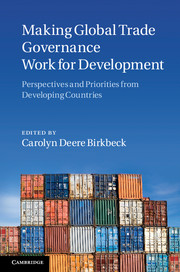 Making Global Trade Governance Work for Development
Making Global Trade Governance Work for Development Book contents
- Frontmatter
- Contents
- Figures
- Tables and boxes
- Contributors
- Acknowledgements
- Introduction
- Part I Global trade governance
- Part II Roles and responsibilities in global trade governance: diversity in developing country priorities and strategies
- Part III Strengthening multilateralism
- 10 The WTO, democracy and development: a view from the South
- 11 Reclaiming development in the world trading system (revisited): proposals for reform of WTO governance
- 12 Fostering developing country engagement in the WTO dispute settlement system
- 13 Rethinking the governance of Aid for Trade
- 14 Strengthening WTO surveillance
- 15 Why not an ombudsperson at the WTO? A proposal for debate
- Part IV Making WTO negotiations and decision-making processes fairer
- Part V Conclusion
- Index
- References
12 - Fostering developing country engagement in the WTO dispute settlement system
outstanding challenges and governance implications
from Part III - Strengthening multilateralism
Published online by Cambridge University Press: 07 September 2011
- Frontmatter
- Contents
- Figures
- Tables and boxes
- Contributors
- Acknowledgements
- Introduction
- Part I Global trade governance
- Part II Roles and responsibilities in global trade governance: diversity in developing country priorities and strategies
- Part III Strengthening multilateralism
- 10 The WTO, democracy and development: a view from the South
- 11 Reclaiming development in the world trading system (revisited): proposals for reform of WTO governance
- 12 Fostering developing country engagement in the WTO dispute settlement system
- 13 Rethinking the governance of Aid for Trade
- 14 Strengthening WTO surveillance
- 15 Why not an ombudsperson at the WTO? A proposal for debate
- Part IV Making WTO negotiations and decision-making processes fairer
- Part V Conclusion
- Index
- References
Summary
Since its inception in 1995, the dispute settlement system of the World Trade Organization (WTO) has provided WTO Members with a successful system of third-party adjudication of intergovernmental disputes. However, the success of the system is not unqualified, especially with respect to the engagement of developing and least developed countries in the system.
There is considerable debate as to whether developing countries are maximizing the opportunities to advance their trade interests provided by the system. This chapter will briefly explain the system and discuss how developing countries have made increasing use of it. It begins by describing the main features of the WTO system, how it applies to developing countries and what special treatment is available to developing countries under the system. It reviews the participation of developing countries in the system since 1995 and discusses the role the Advisory Centre on WTO Law (ACWL) has played in fostering developing and least developed country engagement in the system. The chapter summarizes the ongoing challenges facing developing countries in WTO dispute settlement proceedings, including the complexity of the process, their lack of resources, the lack of public–private sector partnerships, the disuse of alternative mechanisms and the fear of retaliation. Finally, the chapter evaluates some of the alternative mechanisms and proposals to assist developing countries in utilizing the dispute settlement system to the full and concludes that improvements can be made both in streamlining the system itself and in increasing the capacity of developing countries to engage in the system.
- Type
- Chapter
- Information
- Making Global Trade Governance Work for DevelopmentPerspectives and Priorities from Developing Countries, pp. 328 - 351Publisher: Cambridge University PressPrint publication year: 2011
References
- 1
- Cited by
